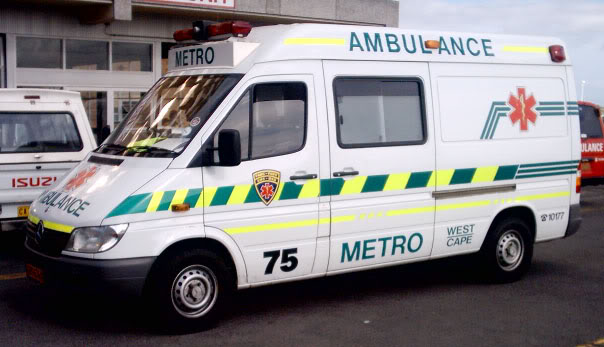The high-risk dangers posed to emergency medical workers have been thrust back into the spotlight, with fears that the situation is now at crisis point. On Wednesday morning, a 7 year old boy died while enroute to Red Cross Children’s Hospital, after the ambulance he was travelling in was held up at gunpoint by armed robbers. Faigon Mitchell was injured in a head-on collision on Tuesday night, when he travelled with his parents down Lansdowne road. He was then rushed to the Delft Day hospital and apparently waited four hours for an ambulance to transport him to the emergency unit at Red Cross Children’s hospital.
According to Emergency Medical Services (EMS) director Shaheem de Vries, the ambulance crew were passing Borcheds Quarry when they struck the remnants of a concrete barrier in the road. The ambulance driver pulled over to ascertain the damage, when they were accosted by a group of gunmen. Faigon died on arrival at the hospital, succumbing to his injuries as a result of the delay in his transportation.
Faigon’s death underlines the safety of emergency medical personnel which has been a persistent challenge for authorities, due to the increase of crime in Cape Town. Paramedics and emergency workers are often caught up in gang crossfire or held at gunpoint by opportunistic criminals.
Earlier this year, EMS listed several red zones, including Manenberg, Hanover Park, Tafelsig, Hyde Park, Nyanga, Gugulethu,. New Crossroads, Kalksteenfontein, Site C, Khayelitsha, J-Section and Lingelethu. In response to the increase in attacks, Western Cape Health MEC Nomafrench Mbombo introduced Operation Khuseleka (Be safe) last year, in order for the police to escort emergency paramedics in high risk areas. Despite this, there have been 30 attacks on EMS workers in this year alone.
Emergency personnel fear for their safety ahead of the festive season, given the anticipated increase in road accidents and crime.
“Criminals are targeting personal valuables such as cellphones, bags, wallets and jewellery, but now there is a trend towards stealing medical equipment, medical bags and electronic equipment, which is not really worth much on the streets. This shows the desperation of criminals,” said De Vries.
Emergency vehicles are tracked and all crew use two channels of communication; via texting on their cell phone and a tetra-radio device through the control centre. There are panic buttons in the emergency vehicles to activate an alert but De Vries said this does not guarantee a prompt response.
“Our plan is to see can we can have a more efficient response to these areas. Our crews are hyper-vigilant around their safety but there is vulnerable moment when they are administering patient care, when they are less aware of what they would normally be. This is would we suspect happened with this crew. “
Any attempts to address the root cause needs to involve all stakeholders, said De Vries. Over the last few months, Emergency Medical Services (EMS) has been engaging the Department of Community Safety, City of Cape Town, community police forums and neighbourwood watches.
“We need to do more to address the collective challenge of violence in our society. We have been encouraged by the progress and forging these relationships with the various inter-governmental agencies,” said De Vries.
“But we want to appeal to communities to rally for this cause. The neighbourhood watches and citizens themselves are an important aspect to securing our staff when we enter areas. Coming out of your house when your neighbour calls for an ambulance or putting the lights on, these are things people can do.”
De Vries said it was a traumatic experience for the staff and they are receiving counselling.
“The paramedic and her partner who was involved in the treatment of the young boy, after having experienced what she did, still got back in the ambulance and executed the transfer. I cannot imagine thinking about the life of someone else at that stage. So we really need to commend all the paramedics who risk their lives on a daily basis.”
In response, the union Hospersa said t is considering withdrawing its emergency medical workers in Cape Town. Hospersa says these attacks have been increasing at an alarming rate where this year, and has seen several incidents reported in not just the Western Cape, but in KwaZulu-Natal, Gauteng, Free State and in Limpopo. The union added that the safety of EMS workers needs to be prioritised as a matter of urgency. VOC






 WhatsApp us
WhatsApp us 

